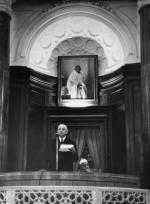'I am still obsessed by the Indian problem,' Nehru went on, 'both in its narrower nationalistic aspect and in its relation to the rest of the world, but doubts arise and no obvious solution seems to one (sic). I welcomed therefore the chance of withdrawing for a while from an active participation in public movements and looking at them if possible from the view point of an outsider. And now, far from India, many questions occur to me - of the general drift of western culture and civilisation, of industrialism and the like - and there are few answers. But the question which affects and troubles me more than any other,' he added, 'is: what is my duty to India and how can I serve her best and reconcile that duty with my other responsibilities.'
Of the weekend in Holland he wrote, 'I feel very much tempted to come. I am not at all sure that I shall be helpful in the friendly discussions and talks that will take place there, but the company of earnest and thoughtful people is always attractive and so I should like to come. I am tied up here for some time and cannot leave my wife. But later I may be able to do so.'11
In September 1926 the two men met for lunch in Geneva at Nehru's request, with the Swedish Archbishop Söderblom as an unlikely third, clearly included by Buchman. Nehru and Buchman lunched once more together, this time after his wife's death in 1936. 'He has had a sad life,' Buchman often said of him.

Nehru had been consulted about the present visit. He had gone through the original invitation committee with Hicks, eliminating six whom he thought too close to the administration but leaving his Minister of Planning, G. L. Nanda. He had sent a message that he looked forward to seeing Buchman again, and had assigned Jaipur House, the former home of the Maharajahs of Jaipur, as a base for Buchman's force while in Delhi. His attitude was polite, even generous, rather than enthusiastic.
Buchman, according to Baynard-Smith, seems to have felt that he had in some way failed Nehru during their earlier meetings. Now he had another chance, and he would not have been Buchman if his expectations had been anything but high. 'Nehru will realise that this philosophy is his best bet', 'Nehru will turn to you more and more' and 'Nehru sees the importance of this work' are the kind of phrases which recur in the notes he dictated. At the same time, he felt he should make no approach to the Prime Minister. 'Make haste slowly...He will come your way.'
On their first day in Delhi Buchman and his full team laid a wreath at Raj Ghat, the place where Gandhi was cremated, and later Buchman addressed a large number of Members of both Houses of Parliament presided over by the Deputy Speaker. He was also officially welcomed by the city. Then he was content to rest until the plays had done their work. As in Bombay the crowds were large and enthusiastic. A Cabinet Minister arrived to find his seat taken. An usher spoke strong words to the occupant, who replied, 'Who do you think I am? I'm a Minister too!' Both were fitted in somehow.
416
Photo: Buchman addressing members of both houses of India's Parliament.
©David Channer/MRA Productions